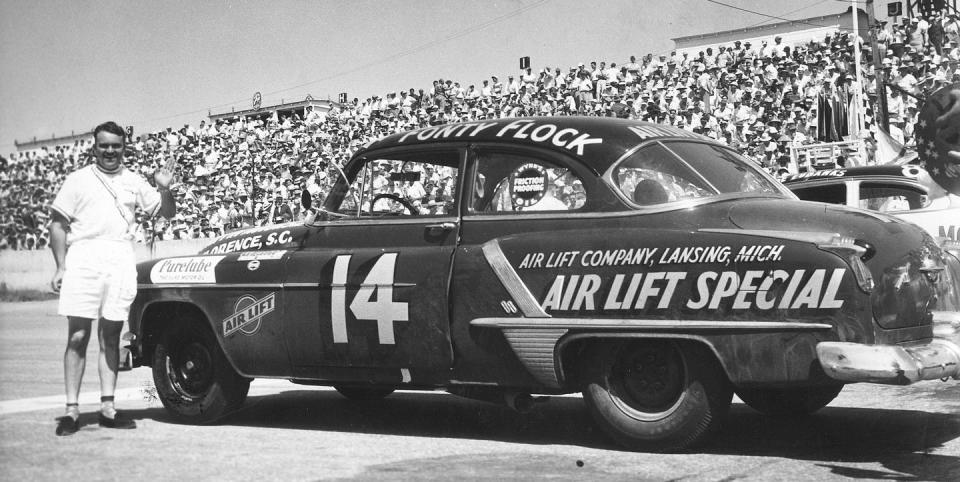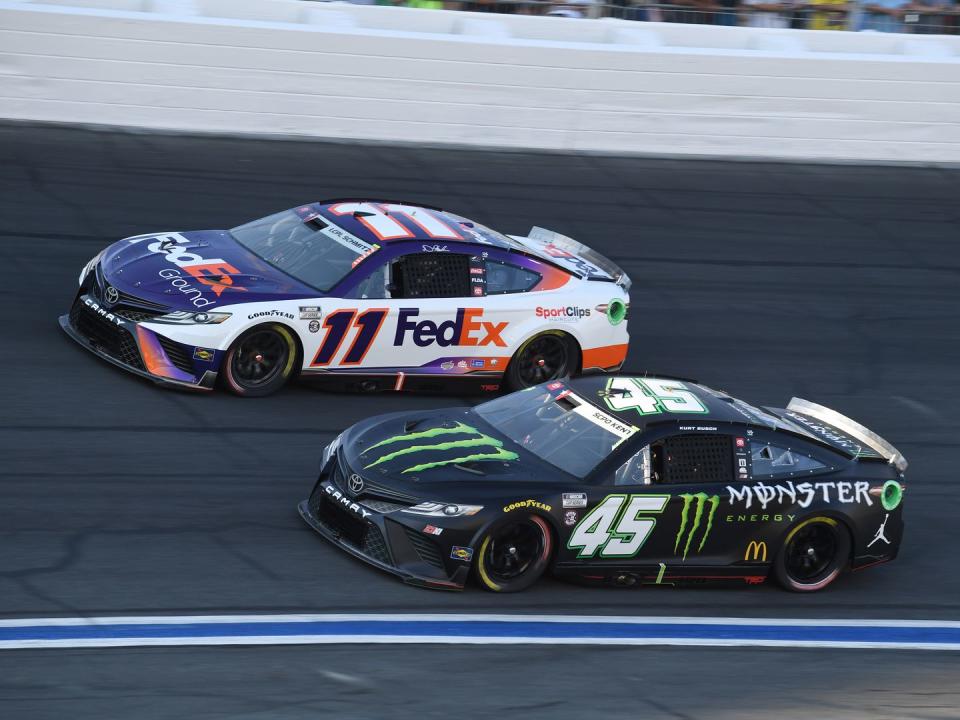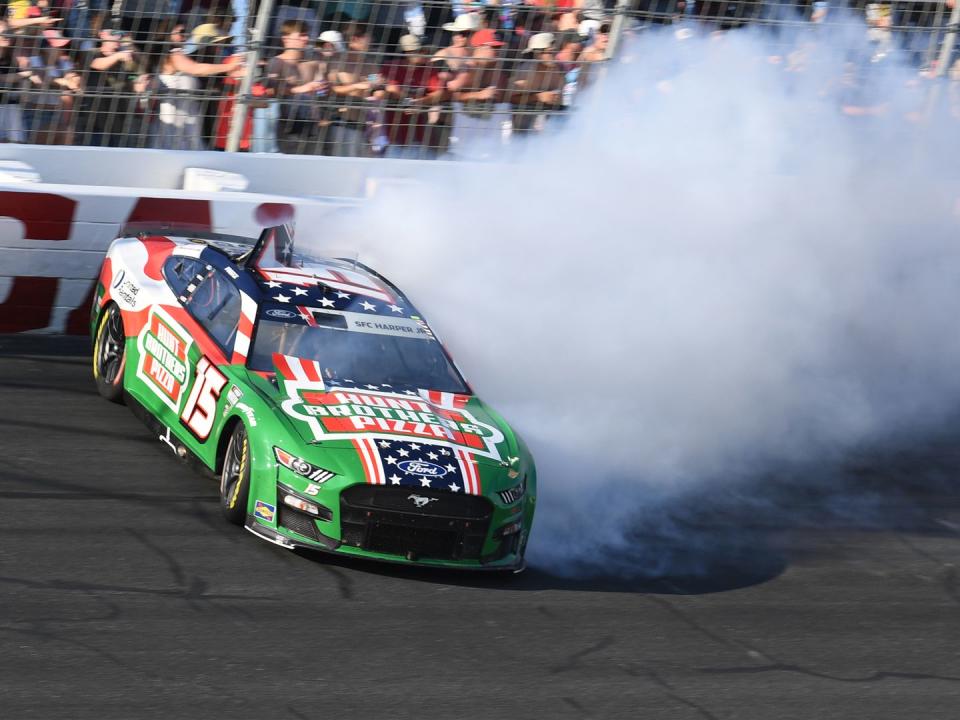To Infinity and Beyond: The Longest Races in NASCAR Cup Series History

Thanks to two overtimes, the 2022 Coca-Cola 600 became the Coca-Cola 619.5, officially the longest race per mile in NASCAR Cup history.
The three longest Cup races per mile in NASCAR history have been held at Charlotte Motor Speedway.
The field for the 1952 Southern 500 turned in the longest race run in the sport’s history, 6 hours and 42 minutes.
As drivers and teams prepare for this weekend’s Coca-Cola 600 at Charlotte Motor Speedway, they work with the knowledge that it’s the longest race of the year.
They also prepare under the shadow of last year’s Coke 600, which not only was the longest race of the year but also was the longest race of ANY year.
Thanks to two overtimes, the 2022 Coca-Cola 600 became the Coca-Cola 619.5, officially the longest race per mile in NASCAR Cup history. Denny Hamlin took the delayed checkered flag in five hours and 13 minutes. Remarkably, after so much time and so many laps (413 instead of the scheduled 400), Hamlin won the race with a last-lap pass of Kyle Busch.
The day (and night) brought back memories of some of NASCAR’s marathon races of its early years. It was almost as if the late Chicago Cubs infielder Ernie Banks, famous for his enthusiastic “Let’s play two!” phrase, had stepped forward to encourage drivers to race into infinity.
The three longest Cup races per mile in NASCAR history have been held at Charlotte Motor Speedway. All were scheduled for 600 miles, but NASCAR’s relatively new green-white-checkered overtime rules piled up more mileage.

Longest Cup Series Races in Distance
Charlotte, May 29, 2022, won by Denny Hamlin, scheduled distance – 600 miles, actual distance – 619.5 miles
Charlotte, May 24, 2020, won by Brad Keselowski, scheduled distance – 600 miles, actual distance – 607.5 miles
Charlotte, May 29, 2011, won by Kevin Harvick, scheduled distance – 600 miles, actual distance – 603 miles
Longest Cup Series Races in Time
Darlington, Sept. 1, 1952, won by Fonty Flock, distance – 546.4 miles, time – 6 hours, 42 minutes
Darlington, Sept. 4, 1950, won by Johnny Mantz, distance – 546.4 miles, time – 6:38
Darlington, Sept. 3, 1951, won by Herb Thomas, distance – 546.4 miles, time – 6:30
The three longest Cup races by the clock were held at then-new Darlington Raceway. As NASCAR’s first superspeedway, the track was seen as the stock car version of Indianapolis Motor Speedway, so it was appropriate that the series attempt a 500-mile race like IMS.
The first Southern 500, held Sept. 4, 1950, featured a 75-car starting field and lasted an astonishing 6 hours and 38 seconds. Not to be outdone, the field for the 1952 500 turned in the longest race run in the sport’s history, 6 hours and 42 minutes. Fonty Flock won and promptly retired from the sport because of exhaustion. No, not really.
Although it’s very unlikely any future Cup races will stretch past six hours, the dynamics of current competition make it quite possible that this Sunday’s Coke 600 (and future 600s) could set records for race distance.
If competition near the end of regulation is close, a late-race caution could push the race past 600 miles, and bumping and thumping during the first overtime could extend the race again. And so on and so on.

For a sport that has leaned toward shorter races both to match contemporary attention spans and television network wishes, the 600 has become something of an anachronism. When it becomes the 619.5, the differences between the race and every other Sunday chase become even more pronounced.
Last year’s 600 (sorry, 619.5) was significantly competitive despite the race’s length. There were four different leaders—Kyle Larson, Kyle Busch, Chase Briscoe and Hamlin—over the final 18 laps before Hamlin made the last-lap pass to win.
The race was interrupted by 18 caution flags, and 16 cars crashed out of the competition.
The history of the Coca-Cola 600 (originally known as the World 600) includes more than a few races in which drivers with potentially winning cars circled the track without real regard to their positioning until the final 50 laps of the race. Then the true competition began. In 28 600s, the driver leading the race at 500 miles has failed to win.
Aware of this attention-dampening situation, track officials once offered big bonus money to the leader at 100-mile race intervals, thus hopefully enhancing race-long competition. Hall of Fame driver David Pearson, four times a winner at Charlotte, dampened that approach somewhat by repeatedly racing in mid-pack but speeding to the front to collect the bonus money and then fading back into safer territory.
Stage racing—stages will end Sunday at 100, 200 and 300 laps—has changed that dynamic to an extent, as top-10 runs at stage completions provide points for the end-of-season playoffs, making lingering outside the top 10 risky business.
Still, the length of the race sometimes contributes to relatively comfortable wins. Hamlin’s last-lap pass of Kyle Busch to win last year’s race is the only last-lap victory pass in the 600 in the past six years. In two of those races, the winning passes were made with 46 and 49 laps remaining.
Will Sunday’s race be another marathon-plus, or simply a marathon?

 Yahoo Autos
Yahoo Autos 